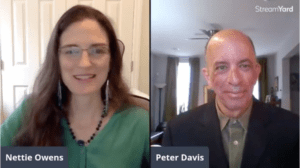Where do you see the topic of life transitions popping up for people in business?
It’s really interesting because if you think about life transitions, you may have a promotion or get new job responsibilities in the professional world. Or, you may have a relationship status change, a family addition, or aging parents that you have to deal with in the family world. In the personal area, there are things like moving and medical, also.
And the thing is, it affects all of our perceptions. It colors how we attack tasks and projects in all areas of life, not just the area that the life transition has taken place. This means it affects not only ourselves but also our staff, vendors, colleagues, and everybody we come in contact with.
“Have you ever tried to prevent a life transition from affecting anything else going on in your life – like business? Were you able to keep it in a neat, little compartment? While we so often want to keep these things separated, it’s practically impossible. They tend to spill over into other parts of your life – no matter how hard you try”
Can we separate personal and business in our decision-making?
You really can’t separate them out. If you think of COVID, which is actually just one big worldwide life transition that’s happening, COVID itself as a health problem is affecting everyone.
We were all thrown into it and didn’t have a whole lot of time to prepare for it, and we didn’t understand it. After all, there has not been a health pandemic like this since 1918, and most of us don’t remember that.
Most people don’t realize that there is a grief cycle that happens with something of this nature.
Most people think of grief as what happens when someone dies. And that it does, so I’m not saying it doesn’t. But if we look at grief in terms of its components, the daze, the shock, the denial, we all did that back in the February, March, and April timeframe. We may have faced it again as well as we got into a second wave.
And then there’s the distress. It may be anxiety, insomnia, and things of that nature. And this is not a nice little progression where you move through daze and into distress, and then you go on to the next one. This is like ping pong, and you can go back and forth. And it means that your thoughts are ping-ponging, too.
There are many different ways to look at grief, and the last one I talk about is discover. And that is the acceptance phase. This is the phase where life is functional again.
So, that grief is a piece that a lot of people don’t realize.
And the second piece that people don’t realize is the impact it has on your ability to do tasks.
Your time is taken up.
Let’s look at COVID in the beginning. We were all getting used to masks. This meant that we might have to go back upstairs or to a different room, or we may have to drive back home because we needed to bring a mask with us. We had to carry hand sanitizer with us. We had to wipe down groceries, which now doesn’t seem to be quite as important. But all of that took a lot of extra time and mental energy that we then couldn’t devote to the regular things that we do.
“Having to make new decisions and create new systems takes a ton of mental energy. And it’s not something that people think about. Have you thought about it as you’ve faced new challenges or gone through a transition in your life?”
What are some of the tools, tips, and ideas that can help you recognize that you are in a life transition and figuring out what’s next?
I concentrate on those that are health-based, and it is often related to a new diagnosis. And that can be everything from the physical, such as a knee replacement, to a new autoimmune disorder that’s just been diagnosed. Or, it can also be something that you’ve had for a while that maybe is now causing new problems
For example, people with ADHD, especially women who are often diagnosed later on, when they have either a job or children and some structure to their schedule, they manage their ADHD pretty well. But when either of those goes away, I help with that from an organizing productivity point of view.
“Coming up with new systems in light of the diagnosis can be transferred to any transition that you may be making in life.”
3 Action Steps
1. Understand that you can’t compartmentalize the portions of your life (i.e., personal and professional).
2. Acknowledge that difficult transitions may leave you going through the various stages of the grief cycle.
3. Creating new systems and processes can help you through a transition.
Connect with Janice Russell on LinkedIn and find out more about Life Transitions Organizing.
Please comment below. I would love to hear from you.














No comments yet.